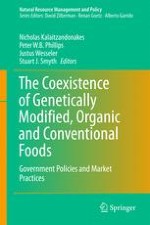2016 | OriginalPaper | Buchkapitel
Developing Solutions for Coexistence in the EU—Legal, Technical, and Economic Issues
verfasst von : Koen Dillen, Ivilin Rizov, Emilio Rodriguez-Cerezo
Erschienen in: The Coexistence of Genetically Modified, Organic and Conventional Foods
Verlag: Springer New York
Aktivieren Sie unsere intelligente Suche, um passende Fachinhalte oder Patente zu finden.
Wählen Sie Textabschnitte aus um mit Künstlicher Intelligenz passenden Patente zu finden. powered by
Markieren Sie Textabschnitte, um KI-gestützt weitere passende Inhalte zu finden. powered by
